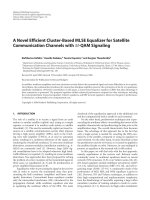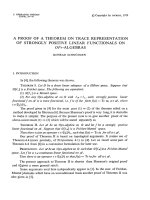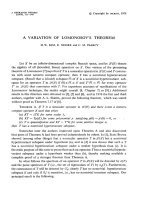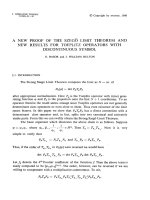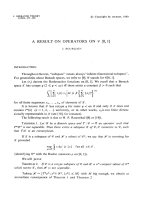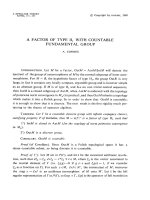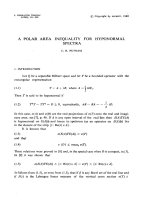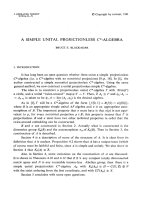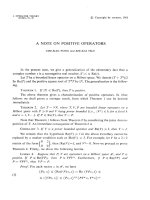Báo cáo toán học: "A Binomial Coefficient Identity Associated with Beukers’ Conjecture on Ap´ry numbers e" docx
Bạn đang xem bản rút gọn của tài liệu. Xem và tải ngay bản đầy đủ của tài liệu tại đây (63.04 KB, 3 trang )
A Binomial Coefficient Identity Associated
with Beukers’ Conjecture on Ap´ery numbers
CHU Wenchang
∗
College of Advanced Science and Technology
Dalian University of Technology
Dalian 116024, P. R. China
Submitted: Oct 2, 2004; Accepted: Nov 4, 2004; Published: Nov 22, 2004
Mathematics Subject Classifications: 05A19, 11P83
Abstract
By means of partial fraction decomposition, an algebraic identity on rational
function is established. Its limiting case leads us to a harmonic number identity,
which in turn has been shown to imply Beukers’ conjecture on the congruence of
Ap´ery numbers.
Throughout this work, we shall use the following standard notation:
Harmonic numbers H
0
=0 and H
n
=
n
k=1
1/k
Shifted factorials (x)
0
=1 and (x)
n
=
n−1
k=0
(x + k)
for n =1, 2, ···.
For a natural number n,letA(n)beAp´ery number defined by binomial sum
A(n):=
n
k=0
n
k
2
n + k
k
2
and α(n) determined by the formal power series expansion
∞
m=1
α(m)q
m
:= q
∞
n=1
(1 − q
2n
)
4
(1 − q
4n
)
4
= q − 4q
3
− 2q
5
+24q
7
+ ··· .
Beukers’ conjecture [3] asserts that if p is an odd prime, then there holds the following
congruence (cf. [1, Theorem 7])
A
p − 1
2
≡ α(p)(modp
2
).
∗
The work carried out during the summer visit to Dalian University of Technology (2004).
the electronic journal of combinatorics 11 (2004), #N15 1
Recently, Ahlgren and Ono [1] have shown that this conjecture is implied by the following
beautiful binomial identity
n
k=1
n
k
2
n + k
k
2
1+2kH
n+k
+2kH
n−k
− 4kH
k
=0 (1)
which has been confirmed successfully by the WZ method in [2].
The purpose of this note is to present a new and classical proof of this binomial-
harmonic number identity, which will be accomplished by the following general algebraic
identity.
Theorem. Let x be an indeterminate and n a natural number. There holds
x(1 − x)
2
n
(x)
2
n+1
=
1
x
+
n
k=1
n
k
2
n + k
k
2
−k
(x+k)
2
+
1+2kH
n+k
+2kH
n−k
−4kH
k
x+k
. (2)
The binomial-harmonic number identity (1) is the limiting case of this theorem. In fact,
multiplying by x across equation (2) and then letting x → +∞, we recover immediately
identity (1).
Proof of the Theorem. By means of the standard partial fraction decomposition,
we can formally write
f(x):=
x(1 − x)
2
n
(x)
2
n+1
=
A
x
+
n
k=1
B
k
(x + k)
2
+
C
k
x + k
where the coefficients A and {B
k
,C
k
} remain to be determined.
First, the coefficients A and {B
k
} are easily computed:
A = lim
x→0
xf(x) = lim
x→0
(1 − x)
2
n
(1 + x)
2
n
=1;
B
k
= lim
x→−k
(x + k)
2
f(x) = lim
x→−k
x(1 − x)
2
n
(x)
2
k
(1 + x + k)
2
n−k
=
−k(1 + k)
2
n
(−k)
2
k
(1)
2
n−k
= −k
n
k
2
n + k
k
2
.
Applying the L’Hˆospital rule, we determine further the coefficients {C
k
} as follows:
C
k
= lim
x→−k
(x + k)
f(x) −
B
k
(x + k)
2
= lim
x→−k
(x + k)
2
f(x) − B
k
x + k
= lim
x→−k
d
dx
(x + k)
2
f(x) − B
k
= lim
x→−k
d
dx
x(1 − x)
2
n
(x)
2
k
(1 + x + k)
2
n−k
= lim
x→−k
(1 − x)
2
n
(x)
2
k
(1 + x + k)
2
n−k
1 −
n
i=1
2x
i − x
−
n
j=0
j=k
2x
x + j
=
n
k
2
n + k
k
2
1+2kH
n+k
+2kH
n−k
− 4kH
k
.
This completes the proof of the Theorem.
the electronic journal of combinatorics 11 (2004), #N15 2
References
[1] S.Ahlgren-K.Ono,A Gaussian hypergeometric series evaluation and Ap´ery number
congruences, J. Reine Angew. Math. 518 (2000), 187-212.
[2]S.Ahlgren-S.B.Ekhad-K.Ono-D.Zeilberger,A binomial coefficient iden-
tity associated to a conjecture of Beukers, The Electronic J. Combinatorics 5 (1998),
#R10.
[3] F. Beukers, Another congruence for Ap´ery numbers, J. Number Theory 25 (1987),
201-210.
Current Address:
Dipartimento di Matematica
Universit`a degli Studi di Lecce
Lecce-Arnesano P. O. Box 193
73100 Lecce, ITALIA
the electronic journal of combinatorics 11 (2004), #N15 3
